Grim toll of ‘missed’ cancer cases: 100,000 patients diagnosed with late-stage disease in emergency rooms when cure is unlikely, shocking new five-year figures suggest
More than 100,000 patients have been diagnosed with cancer in emergency departments in the past five years, according to alarming new figures.
Experts warn that those picked up this way are often in the later stages of the disease, when it is more expensive and difficult to treat and the chances of survival are lower.
It comes amid unprecedented dissatisfaction with GPs and long wait times for diagnostic tests, with patients often struggling to be seen.
Cancer Research UK described the situation as ‘unacceptable’ and warned it could affect patients’ chances of beating the disease.
Meanwhile, the Catch Up With Cancer campaign said late diagnoses in A&E are a “certain sign that our national approach to cancer is simply not working.”
Experts warn that cancers picked up through emergency rooms are often in the later stages, when they are more expensive and difficult to treat and survival rates are lower
Patients should normally be referred for cancer checks after visiting their GP with early symptoms, rather than when they are so ill that they need to go to the emergency department.
Some 24,159 patients were diagnosed after attending emergency departments at the 29 NHS acute trusts in England responding to freedom of information requests from 2018 to 2023.
Extrapolated to all trusts in England, including those that did not provide data, the actual number is likely to be as high as 106,000.
Of the trusts that responded, Kings College Hospital in London recorded the highest number of diagnoses after referral to A&E, with 4,269 between 2018 and 2023.
Countess of Chester Hospital NHS Foundation Trust saw almost 32 times as many patients diagnosed in A&E in 2023 (587) as in 2018 (18) – the biggest jump among trusts that responded.
Studies show that early diagnosis of cancer is crucial, with every month of delay in starting treatment typically reducing survival chances by 10 percent.
For example, nine in ten people who get bowel cancer at an early stage, in the first stage, will survive for five years or more, but this drops to just one in ten among those diagnosed late, in the fourth stage.
Wes Streeting, Labour’s shadow health and social care secretary, who made the FOI requests (must keep them), said: ‘More than 100,000 patients have been diagnosed with cancer in A&E in the last five years – and I am one of them.
‘We have diagnosed more patients in A&E than in any other comparable country, which shows that we are arriving far too late.
‘I was lucky, but far too many cancer patients have to wait dangerously long for tests and scans, which costs lives.
‘Thanks to Labour’s fully funded plan, the NHS will detect cancer early, diagnose it earlier and treat it faster, so cancer doesn’t have to be a death sentence.’
Michelle Mitchell, CEO of Cancer Research UK, said: ‘Too many people are diagnosed with cancer late, and in some cases not until their symptoms become severe enough to require a visit to A&E.
‘This is not acceptable. We know that detecting cancer as early as possible is crucial to improving outcomes.
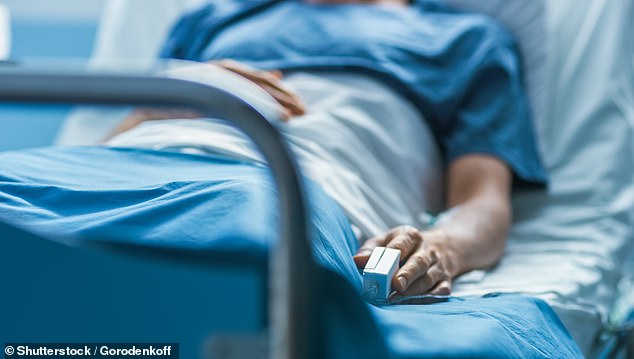
Studies show that early diagnosis of cancer is crucial, with every month of delay in starting treatment typically reducing survival chances by 10 percent.
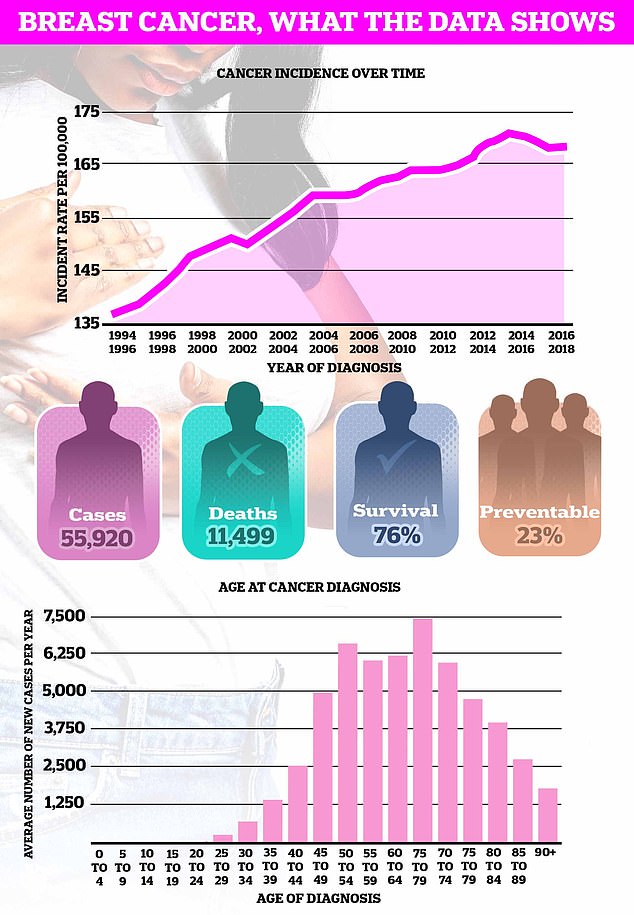
Breast cancer is the most common cancer in Britain, with around 56,000 cases diagnosed each year
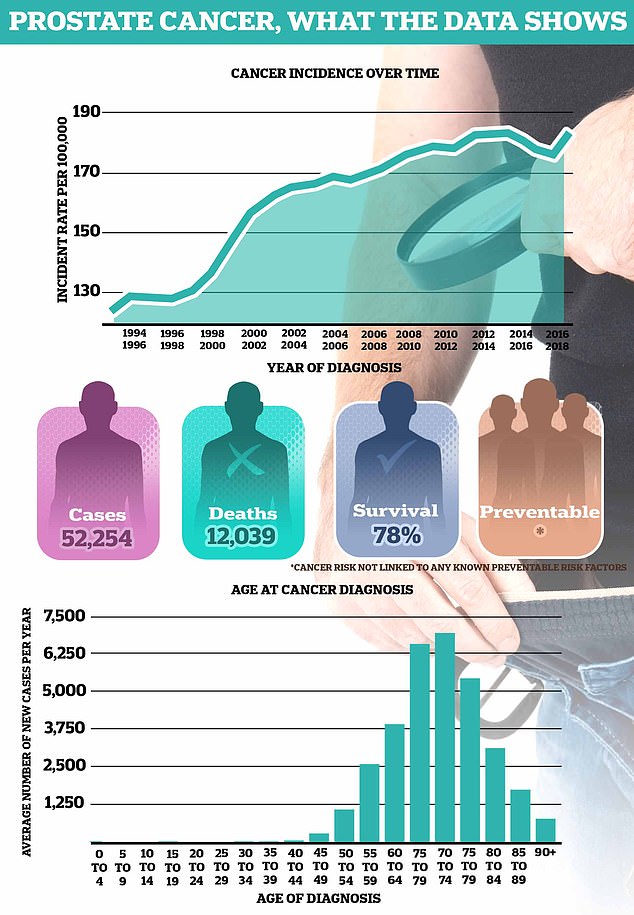
Prostate cancer follows closely behind with 52,000 cases per year in men
‘Years of underinvestment in NHS cancer services have meant that patients – along with their families and loved ones – face long and anxious waits before finding out if they have cancer and starting treatment.
‘It is possible to implement the reforms needed to transform cancer services in England, but we need the next UK government to show strong leadership on cancer and commit to a long-term strategy for cancer research and care. ‘
GPs made 260,108 urgent cancer referrals in April, compared to 254,594 in March and also year-on-year compared to 218,324 in April 2023.
The proportion of patients who did not wait more than 62 days for an urgent referral for suspected cancer or consultant upgrade to their first definitive cancer treatment in April was 66.6 per cent, down from 68.7 per cent in March and below the target of 85 percent.
According to data from NHS England, around 73.5 per cent of patients in England referred urgently for suspected cancer in April were diagnosed with cancer or ruled out within 28 days.
This is lower than the 77.3 percent of the previous month and is therefore below the target of 75 percent.
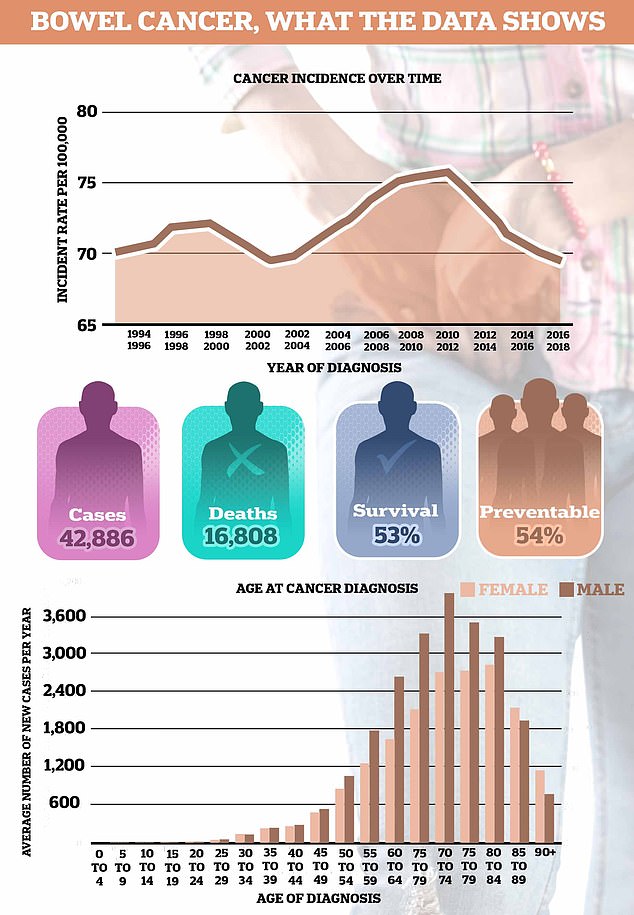
Bowel cancer is the fourth most common form of cancer and kills 16,800 Britons every year
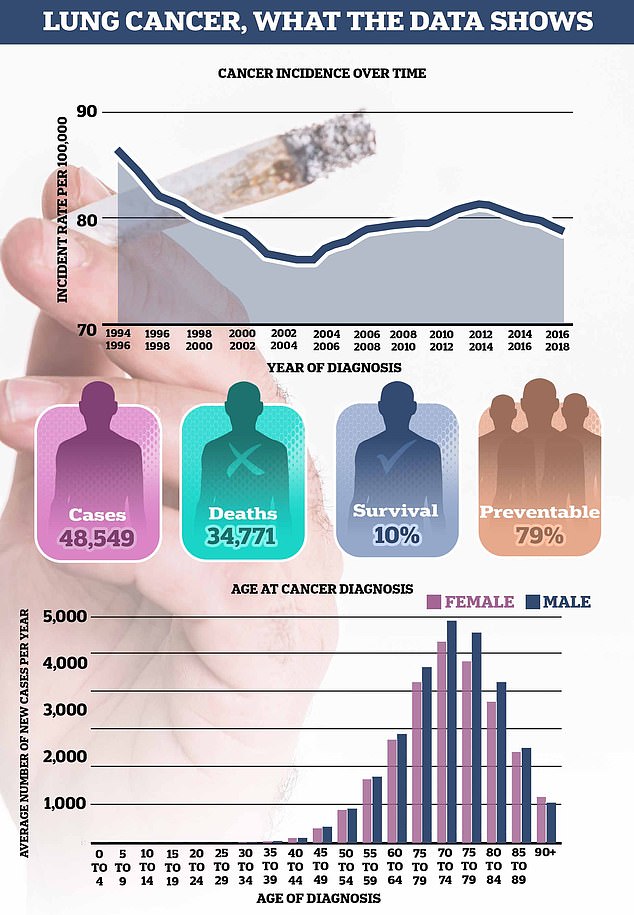
Although lunchtime cancer is not the most common form of the disease, it is one of the biggest cancer killers in Britain, with a survival rate of just 10 percent.
Leading oncologist Professor Pat Price, co-founder of the Catch Up With Cancer campaign and chairman of Radiotherapy UK, said: ‘Having so many cancers picked up in A&E is a clear sign that our national approach to cancer is simply not it works.
‘The entire cancer system is cracking. That is why we need a specific national cancer plan.
‘I obviously welcome efforts to encourage screening and diagnosis.
‘However, encouraging the diagnosis alone is not sufficient if we then simply add the patients to an already far too long waiting list for treatment.
‘I therefore urge all politicians involved to accept the need to also increase treatment capacity, especially in areas such as radiotherapy.’
A Conservative spokesperson said cancer survival rates continue to improve as the disease is more likely to be diagnosed at an earlier stage.
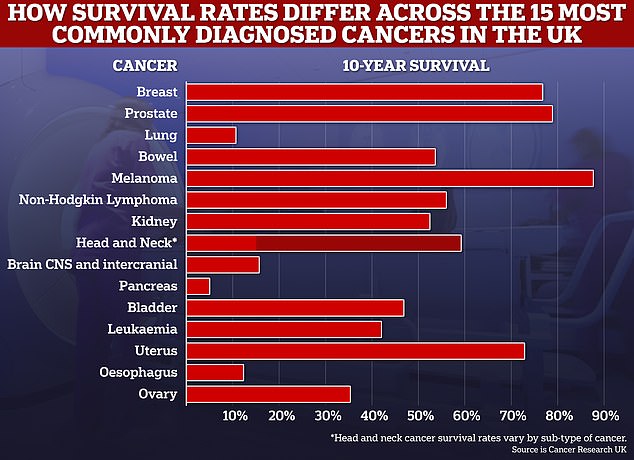
Ten-year survival rates for common cancers have now topped 50 percent, and experts say further improvements can be made in the coming decade.
But he added: ‘We know there is still more to do, which is why we have recruited record numbers of doctors and nurses and will deliver 92,000 nurses and 28,000 more doctors through our NHS long-term workforce plan.
‘We have also opened 160 community diagnostic centers and will carry out millions of scans, tests and checks every year to speed up results and start treatment faster.
‘Where Labor in Wales runs the NHS, patients are waiting longer to start cancer treatment.
‘Their NHS promises are completely unfunded – they can’t deliver £6 billion worth of scanners with less than £1 billion in funding.’
